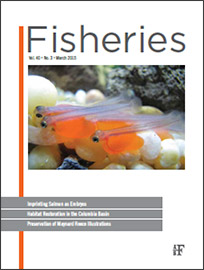Participation in HAMAR (Hatchery-origin Animals in Management of Aquatic Resources)
For decades, the American Fisheries Society (AFS) has worked with leading aquatic resource scientists and natural resource managers to describe effective roles of cultured fishes in aquatic resource management. Approximately every 10 years, a cross section of North American resource managers and representatives from AFS Sections and Divisions come together to address and reconcile contentious management issues regarding the uses of hatchery origin fish.
Most recently, this group met under the banner of “Propagated Fishes in Resource Management” (PFIRM), and produced Considerations for the Use of Propagated Fishes in Resource Management. These guidelines were the first comprehensive publication that tied science based information with political realities of management, and provided the aquatic resources community and decision makers with a set of consensus guiding principles for the use of hatchery origin fish.
Science based fisheries management findings continue provide new information to strengthen the decision making of natural resource agencies, and new challenges continue to emerge. Now the next cycle of this process, tentatively titled “Hatchery origin Animals in Management of Aquatic Resources” (HAMAR) is underway. A symposium is being developed to serve as a fact finding session, targeting all current issues of concern related to the use of hatchery origin fish and shellfish. Following the symposium, the HAMAR steering committee will distill the content of the symposium into a series of point/counterpoint summaries, collect additional information or perspectives as needed, and, via a facilitated workshop or similar process, oversee the development of the next set of guiding principles for the use of hatchery origin fish and shellfish in resource management. Thank you to Jeff Hill, Past President of IFS, who serves as the section’s representative on the HAMAR steering committee.


